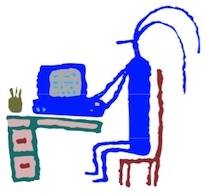
A free resource for nonprofit organizations, NGOs, civil society organizations,
charities, schools, public sector agencies & other mission-based agencies
by Jayne Cravens
via coyotecommunications.com & coyoteboard.com (same web site)


Choosing a Web Site Server (host) &
URL
associated costs, "free" web sites,
domain names, etc.
My own web site is hosted by Hostgator, for about $5 a month, and I'm a very satisfied customer. In addition to lots of web space, I get lots of online reference information and online tutorials, great customer service, and "pop" accounts (allowing me to have email addresses using my own domain name). I highly recommend it to mission-based organizations. In addition, no one at HostGator has ever slaughtered an elephant and the company does not use a sexist advertising campaign to promote itself, something that cannot be said of another popular web hosting company. I've used Network Solutions and Dotster as well for domain registration, but they also offer web hosting.
The URL (web address) you choose, if it is your own, is YOURS, and can be pointed to whatever server where your web site resides. My web site, coyotecommunications.com, has had two different web hosts over the years, but my web address never changes. So don't worry if you choose a web host now and, in a year or two, want to move it. Just make sure, before you pay a web host, that you ask, "Do I own the URL, or do you?"
If your nonprofit absolutely cannot afford five bucks a month, and your Internet provider doesn't include web space in the package you are already paying for, then find a board member, volunteer or other supporter willing to pay this fee for you with a reputable web host. This is an excellent thing to create a crowdfunding campaign around - raising $100 to cover your web hosting for more than a year.
I do NOT recommend free web site hosts, EVER, because:
Be careful in using platforms like WordPress, Wix, Weebly or other drag-and-drop web development platforms - the templates they provide are NOT made to meet accessibility guidelines. If you are going to use such a platform, use it only for your first, initial, basic website, and have a plan (and budget accordingly) to replace that initial, basic website entirely with a more robust and more accessible site.
Your organization deserves better than what a free web site host can offer!
If you want your organization's Web site to have advanced functions, like interactive databases, dynamic content (that automatically updates itself), etc., you will need a server that can provide you with these functions. Ask the web hosting company you want to choose if they can host these functions (they will NOT build such for you, however).
DON'T attempt to buy your own server! The cost of staff time to keep the server up and functional is TREMENDOUS. Most web hosting sites offer packages where you can use advanced functions.
Choosing your web address
When considering your Web address (also called a domain name or URL), your Web address should be:
Also see:

 my home
page
my home
page my
consulting services & my workshops
& presentations
my
consulting services & my workshops
& presentations my
credentials & expertise
my
credentials & expertise Affirmation that this web site is
created & managed by a human.
Affirmation that this web site is
created & managed by a human. My book: The
Last Virtual
Volunteering Guidebook
My book: The
Last Virtual
Volunteering Guidebook contact me
or see my
schedule
contact me
or see my
schedule Free Resources: Community Outreach, With & Without Tech
Free Resources: Community Outreach, With & Without Tech Free Resources: On
Community Engagement, Volunteering & Volunteerism
Free Resources: On
Community Engagement, Volunteering & Volunteerism Free Resources: Technology
Tips for Non-Techies
Free Resources: Technology
Tips for Non-Techies Free Resources:
Nonprofit, NGO & other mission-based management resources
Free Resources:
Nonprofit, NGO & other mission-based management resources Free Resources: Web
Development, Maintenance, Marketing for non-Web designers
Free Resources: Web
Development, Maintenance, Marketing for non-Web designers Free Resources: Corporate
philanthropy / social responsibility programs
Free Resources: Corporate
philanthropy / social responsibility programs Free Resources: For people
& groups that want to volunteer
Free Resources: For people
& groups that want to volunteer linking to
or from my web site
linking to
or from my web site The
Coyote Helps Foundation
The
Coyote Helps Foundation me on
social media (follow me, like me, put me in a circle,
subscribe to my newsletter)
me on
social media (follow me, like me, put me in a circle,
subscribe to my newsletter)To know when I have developed a new
resource related to the above subjects, found a great
resource by someone else, published
a
new blog,
uploaded a new
video,
or to when & where I'm training or presenting, use any
of the following social media apps to follow me on any of
these social media platforms:
Disclaimer: No guarantee of accuracy or suitability is made by
the poster/distributor of the materials on this web site.
This material is provided as is, with no expressed or implied
warranty or liability.
See my web site's privacy policy.
Permission is granted to copy, present and/or distribute a limited amount of material from my web site without charge if the information is kept intact and without alteration, and is credited to:

Otherwise, please contact me for permission to reprint, present or distribute these materials (for instance, in a class or book or online event for which you intend to charge).
The art work and material on this site was created and is copyrighted 1996-2024